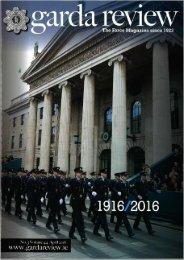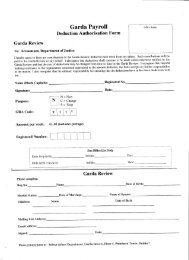Conference Report 2016
Table of contents contains links on page 5. It can be used to skip through chapters.
Table of contents contains links on page 5. It can be used to skip through chapters.
Create successful ePaper yourself
Turn your PDF publications into a flip-book with our unique Google optimized e-Paper software.
Section 1: Pay and Allowances<br />
and a half for ordinary duty and double time for<br />
Sundays. For ordinary overtime where members<br />
apply voluntarily to work overtime the rate has been<br />
reduced (under the provisions of the Haddington<br />
Road Agreement) to time and a quarter. From a<br />
comparative perspective, it is insightful (if not<br />
somewhat infuriating) to review the data<br />
summarising the key results of an IBEC (2001)<br />
survey of overtime premia in 508 companies in the<br />
Irish manufacturing and wholesale distribution<br />
sectors. This indicates that the lowest<br />
compensation ratio in use is Time + ½ in sharp<br />
contrast with the Time + 1⁄4 applied to gardaí. Many<br />
employers pay considerably more than this ratio.<br />
5.67 The relatively privileged position of private sector<br />
workers compared with gardaí on this pay criterion,<br />
a more expansive survey on the same topic was<br />
concluded by IBEC in March 2006. This overtime<br />
report entailed a survey of 760 places of<br />
employment across the manufacturing, distribution<br />
and services sectors. This also revealed that that<br />
the lowest compensation ratio in use is Time + ½.<br />
The updated dataset (2013) covering 436<br />
companies employing 141,444 staff in the<br />
manufacturing, distribution and service sectors<br />
reveals yet again that many employers pay<br />
considerably more than An Garda Síochána for antisocial<br />
and overtime working arrangements.<br />
unsocial hours Shiftworking<br />
5.68 The basic position towards shift pay arrangements<br />
affected by the revised rostering system<br />
Westmanstown Agreement needs redress. The<br />
treatment of unsocial hours in An Garda Síochána;<br />
premium payments for night work start at time and<br />
a sixth (for 6pm to 8pm) rising to time and a quarter<br />
(8pm to 8am); with a fixed daily allowance for<br />
Saturday work (€15 per day) and double time for<br />
Sunday duty.<br />
5.69 Payment for unsocial hours is also much less<br />
favourable for members of An Garda Síochána than<br />
other workers. This is attributable to the usage of a<br />
1/41th of weekly pay as the key divisor.<br />
5.70 This relative deprivation for gardaí also extends to<br />
shift premium payment arrangements. A cursory<br />
review of the data drawn from IBEC’s (2009) survey<br />
of 93 companies employing 41,443 staff confirms<br />
the relatively disadvantageous premia payment<br />
ratio applicable to gardaí. A comparative analysis of<br />
the garda evening premium at time and a sixth<br />
(16.7%) compares unfavourably with that of all other<br />
premia for evening work on two, three and four shiftcycles.<br />
The ratio applied to Gardaí for night work<br />
(8pm-8am at time and a quarter) compares<br />
unfavourably with that of the overwhelming majority<br />
of other premia paid.<br />
Employment Conditions<br />
5.71 The conditions of employment of the Garda rank is<br />
both extensive and complex spanning health, safety<br />
and welfare, rosters, career breaks, pension<br />
provisions, incentivised early retirement.<br />
5.72 The Association retains grave reservations about<br />
the process and provisions associated with the<br />
Public Service Management (Sick Leave)<br />
Regulations 2014. Furthermore, there is now clear<br />
evidence that the Westmanstown Working Time<br />
Agreement is being abused. The revised rostering<br />
arrangements have revolutionised the shift patterns<br />
and reconfigured available resources in An Garda<br />
Síochána. However, it would appear that there is a<br />
lack of compliance with the daily rest requirements<br />
of the European Working Time Directive and the<br />
compensatory rest requirements of the Working<br />
Time Agreement.<br />
5.73 To ensure compliance with all provisions an<br />
effective information technology system providing<br />
comprehensive, accurate and verifiable records is<br />
crucial and has already been identified as essential<br />
to compliance by the Garda Inspectorate in its sixth<br />
report.<br />
5.74 There are also issues of concern regarding the<br />
ability of members to take leave when required.<br />
There is a delicate balance between derogations<br />
and the all-important protections and the relevant<br />
review team should be fully focused on assessing<br />
and ensuring same compliance. Appropriate<br />
arrangements must be made by way of primary<br />
legislation or ministerial order to enable the WTA to<br />
be subject to the Labour Court approval process set<br />
out in the Organisation of Working Time Act 1997.<br />
Annualised hours<br />
5.75 The GRA agreed to outline its basic position towards<br />
an annualised hours arrangement. The recently<br />
revised rostering system or Westmanstown<br />
Agreement is the subject of a discrete review<br />
process or processes. However, the Association<br />
acknowledges the relevance of an annualised hours<br />
system towards this revised rostering system and<br />
the unique demands associated with working in An<br />
Garda Síochána.<br />
5.76 The revised roster is a five unit, 10-week<br />
configuration operating on the principle of six days<br />
38th Annual Delegate <strong>Conference</strong><br />
3




